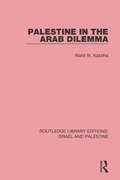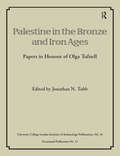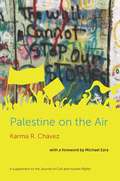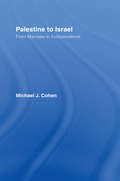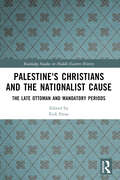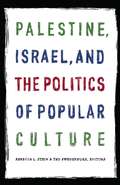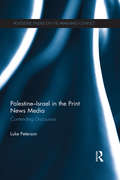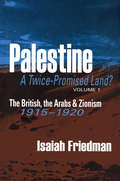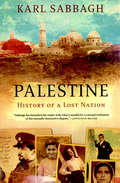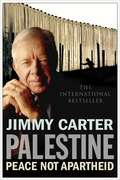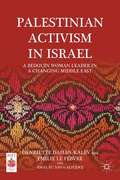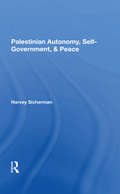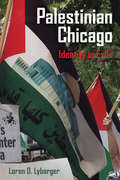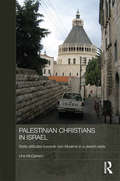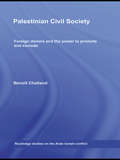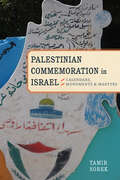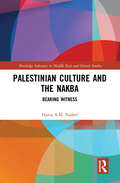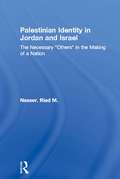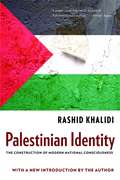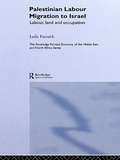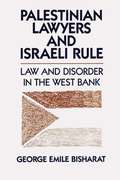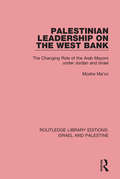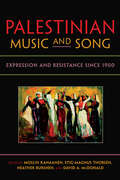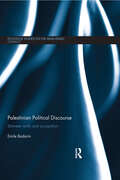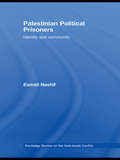- Table View
- List View
Palestine in the Arab Dilemma (Routledge Library Editions: Israel and Palestine)
by Walid W. KazzihaFor a long time the understanding of the Palestinian question has been dominated by the views offered by the Arab governments on the Israeli establishment. But any close examination of the policies of the Arab regimes would reveal that they have done very little to alleviate the plight of the Palestinians. Since the defeat of the Arab regime in June 1967, an increasing number of Arab scholars and intellectuals have been seriously and independently involved in reassessing the political and social conditions of their societies. This book, first published in 1979, is part of that more general attempt to discover the deep-rooted causes of defeat and the general state of socio-economic underdevelopment of the Arab region. The central theme of the four essays in this study pertains to the fluctuating relationship between the Arab regimes and the Palestinian Resistance Movement. It is within this context that the first essay examines the various factors which shaped the relationship at different intervals. The second then goes on to present a case study of how the contradictions between the Arab regimes and the Resistance Movement operate in a crisis situation and reach the level of an armed confrontation. The third essay examines the prospects for peace and war in the region in the light of the political conditions given before Sadat’s visit to Israel. And finally the fourth essay is concerned with Sadat’s peace initiative and its consequences on the relations between Egypt and the Palestinian Resistance Movement.
Palestine in the Bronze and Iron Ages (UCL Institute of Archaeology Publications)
by Jonathan N. TubbA collection of key articles on Syro-Palestinian archaeology of the Bronze and Iron Ages compiled in honor of archaeologist Olga Tufnell, excavator of the biblical city of Lachish, including contributions by Amiran, Callaway, Dever, Stager, and Ussishkin.
Palestine on the Air (Common Threads)
by Michael EzraFew doubt the pro-Israel bias of the Western media. It takes the form of overtly supporting Israel's government policies, or of maintaining neutrality or silence on issues of Israeli violence, occupation, and settlement expansion. Scholar and activist Karma R. Chávez collects eleven interviews that allow dissenting voices a forum to provide rarely heard perspectives on the Palestinian struggle for justice, land, and self-determination.This volume in the Common Threads series is a supplement to the Journal of Civil and Human Rights. The conversations within took place on a radio program Chávez hosted from 2013-16. There, journalists, activists, academic figures, authors, and Palestinian citizens of Israel shared a wide range of thoughts and experiences. Participants covered topics that include: everyday life for Palestinians in the West Bank and in Israel; the Boycott, Divestment, Sanctions (BDS) movement that arose in response to Israel's ongoing actions; the Steven Salaita controversy at the University of Illinois; the pro-Palestine social movement on college campuses; Israel's pinkwashing of human rights abuses; the aftermath of the 2014 attack on Gaza; and Chávez's 2015 visit to the West Bank.
Palestine to Israel: From Mandate to Independence
by Michael J. CohenThis collection of articles analyzes the underlying motivation, strategy and interests which lay behind "Great Power" (British and post-World War II American) involvement in Palestine and the Middle East, from 1917 to 1948.
Palestine's Christians and the Nationalist Cause: The Late Ottoman and Mandatory Periods (Routledge Studies in Middle Eastern History)
by Erik FreasThis book provides an historical overview of Palestine’s Christian communities and their role in the Palestinian nationalist movement during the late Ottoman and British mandatory periods.More than being a history of Palestine’s Christian Arabs, the book focuses on Palestine’s Christians during the formative period of Palestinian Arab national identity, attentive to the broader topic of the relationship between nationalism and religion—in this case, between Arab identity and Islam. Whereas until recently historians have tended to assume that national and religious identities are distinct and mostly mutually exclusive things, more recent scholarship has addressed the fact that often there exists considerable overlap between the two, though it should be noted, often in ways that are not by any means inherently exclusive of those not belonging to the majority faith, as is the case here. The relationship is also an ever-changing one, hence the final chapter of the book, which functions as something of an epilogue regarding the current status of Palestine’s Christians vis-à-vis their place in the nationalist cause and relationship with the broader Muslim population.The book will be of interest to historians and scholars focused on the modern Middle East, Palestinian history, Muslim-Christian inter-communal relations, and the relationship between nationalism and religion.
Palestine, Israel, and the Politics of Popular Culture
by Rebecca L. Stein Ted SwedenburgThis important volume rethinks the conventional parameters of Middle East studies through attention to popular cultural forms, producers, and communities of consumers. The volume has a broad historical scope, ranging from the late Ottoman period to the second Palestinian uprising, with a focus on cultural forms and processes in Israel, Palestine, and the refugee camps of the Arab Middle East. The contributors consider how Palestinian and Israeli popular culture influences and is influenced by political, economic, social, and historical processes in the region. At the same time, they follow the circulation of Palestinian and Israeli cultural commodities and imaginations across borders and checkpoints and within the global marketplace. The volume is interdisciplinary, including the work of anthropologists, historians, sociologists, political scientists, ethnomusicologists, and Americanist and literary studies scholars. Contributors examine popular music of the Palestinian resistance, ethno-racial "passing" in Israeli cinema, Arab-Jewish rock, Euro-Israeli tourism to the Arab Middle East, Internet communities in the Palestinian diaspora, caf culture in early-twentieth-century Jerusalem, and more. Together, they suggest new ways of conceptualizing Palestinian and Israeli political culture. Contributors. Livia Alexander, Carol Bardenstein, Elliott Colla, Amy Horowitz, Laleh Khalili, Mary Layoun, Mark LeVine, Joseph Massad, Melani McAlister, Ilan Papp, Rebecca L. Stein, Ted Swedenburg, Salim Tamari
Palestine-Israel in the Print News Media: Contending Discourses (Routledge Studies on the Arab-Israeli Conflict)
by Luke PetersonIsrael-Palestine in the Print News Media: Contending Discourses is concerned with conceptions of language, knowledge, and thought about political conflict in the Middle East in two national news media communities: the United States and the United Kingdom. Arguing for the existence of national perspectives which are constructed, distributed, and reinforced in the print news media, this study provides a detailed linguistic analysis of print news media coverage of four recent events in the Palestinian-Israeli conflict in order to examine ideological patterns present in print news media coverage. The two news communities are compared for lexical choices in news stories about the conflict, attribution of agency in the discussion of conflict events, the inclusion or exclusion of historical context in explanations of the conflict, and reliance upon essentialist elements during and within print representations of Palestine-Israel. The book also devotes space to first-hand testimony from journalists with extensive experience covering the conflict from within both news media institutions. Unifying various avenues of academic enquiry reflecting upon the acquisition of information and the development of knowledge, this book will be of interest to those seeking a new approach to the Palestinian-Israeli conflict.
Palestine: A Twice-Promised Land?
by Isaiah FriedmanIn this book, Isaiah Friedman examines one of the most complex problems that bedeviled Middle East politics in the interwar period, one that still remains controversial. The prevailing view is that during World War I the British government made conflicting commitments to the Arabs, to the French, and to the Jews. Through a rigorous examination of the documentary evidence, Friedman demolishes the myth that Palestine was a "twice-promised land" and shows that the charges of fraudulence and deception leveled against the British are groundless.Central to Arab claims on Palestine was a letter dated 24 October 1915, from Sir Henry McMahon, the British High Commissioner in Egypt, to King Hussein, the Sharif of Mecca, pledging Arab independence. Friedman shows that this letter was conditional on a general Arab uprising against the Turks. Predicated on reciprocal action, the letter committed the British to recognize and uphold Arab independence in the areas of the Fertile Crescent once it was liberated by the Arabs themselves. As all evidence shows, few tribes rebelled against the Turks. The Arabs in Palestine, Syria, and Mesopotamia fought for the Ottoman Empire against the British. In addition to its non-binding nature, McMahon's letter has been misinterpreted with respect to the territories it covers. Friedman's archival discovery of the Arabic version actually read by Hussein indisputably shows that Palestine was not included in the British pledge. Indeed, Hussein welcomed the return of the Jews just as his son Emir Feisal believed that Arab-Jewish cooperation would be a means to build Arab independence without the interference of the European powers.Myth-shattering and meticulously documented, Palestine: A Twice-Promised Land? is revisionist history in the truest sense of the word.
Palestine: History of a Lost Nation (Books That Changed the World)
by Karl Sabbagh&“A vital yet unfamiliar perspective on the ongoing Israeli-Palestinian conflict and a heartfelt, judicious invitation to dialogue&” (Publishers Weekly). Palestinians feature regularly in news headlines, but their country is much less known. In this humane and deeply compelling book, Karl Sabbagh traces Palestine and Palestinians from their roots in the mélange of tribes, ethnic groups, and religions that have populated the region for centuries, and describes how, as a result of the interplay of global power politics, the majority of Palestinians were expelled from their home to make way for the new Jewish state of Israel. Palestine: History of a Lost Nation offers a sympathetic portrait of the country&’s rich heritage, as well as evidence of the long-standing harmony between Arabs (Muslim and Christian) and the small indigenous Jewish population in Palestine. Karl Sabbagh has written both a transporting narrative and a meditation on a region that remains a flashpoint of conflict—a story of how past choices and actions reverberate in the present day. &“A powerful and graceful polemic.&” —Kirkus Reviews &“A welcome addition to a new mini-genre of works on Israel and Palestine that focus on people rather than politicians . . . Sabbagh writes with an easy, engaging style . . . [a] poignant, often moving work.&” —Guardian &“Sabbagh has furnished the reader with what is needed for a rational settlement of this mutually destructive dispute.&” —Jonathan Miller &“A uniquely intimate portrait of a vibrant land that has always known conflict but, for its people (including both Jews and Muslims), has nevertheless provided continuity, pride, and especially identity.&” —Booklist
Palestine: Peace Not Apartheid (Thorndike Nonfiction Ser.)
by Jimmy CarterPresident Carter, who was able to negotiate peace between Israel and Egypt, has remained deeply involved in Middle East affairs since leaving the White House. He has stayed in touch with the major players from all sides in the conflict and has made numerous trips to the Holy Land, most recently as an observer in the Palestinian elections of 2006.In this book President Carter shares his intimate knowledge of the history of the Middle East and his personal experiences of the principal actors, and he addresses sensitive political issues many British and American officials shy from. PALESTINE is a challenging and provocative book. Pulling no punches, Carter prescribes steps that must be taken for the two states to share the Holy Land without a system of apartheid or the constant fear of terrorism.
Palestinian Activism in Israel
by Henriette Dahan-Kalev Emilie Le Febvre Amal El�sana-Alh�joojA close description of Amal El'Sana-Alh'jooj's experiences as a Palestinian Bedouin female activist, this book explores Amal's activism and demonstrates that activists' biographies provide a means of understanding the complexities of political situations they are involved in.
Palestinian Autonomy, Self-government, And Peace
by Harvey SichermanDescribing the changes of heart and mind that reordered the Middle East in the wake of the First World War, AlbertHourani, one of the great scholars of the modern Middle East,has written: "Wars are catalysts, bringing to consciousness feelings hitherto inarticulate and creating expectations of change." The Gulf War of early 1991 bears the signs of having been such a catalyst. Having proved its assertiveness and strength, and having led a wide-ranging coalition into battle,the United States has, since the war's end, embarked on an energetic diplomatic effort aimed at settling the long-standing conflict between the majority of the Arab states and Israel. The peace conference that Secretary of State James A. Baker III has organized will grapple with a number of issues. One of the most contentious and significant will be the future of thePalestinians of Gaza and the West Bank.
Palestinian Chicago: Identity in Exile (New Directions in Palestinian Studies #1)
by Loren D. LybargerA free open access ebook is available upon publication. Learn more at www.luminosoa.org. Chicago is home to one of the largest, most politically active Palestinian immigrant communities in the United States. For decades, secular nationalism held sway as the dominant political ideology, but since the 1990s its structures have weakened and Islamic institutions have gained strength. Drawing on extensive fieldwork and interview data, Palestinian Chicago charts the origins of these changes and the multiple effects they have had on identity across religious, political, class, gender, and generational lines. The perspectives that emerge through this rich ethnography challenge prevailing understandings of secularity and religion, offering critical insight into current debates about immigration and national belonging.
Palestinian Christians in Israel: State Attitudes towards Non-Muslims in a Jewish State (Durham Modern Middle East and Islamic World Series)
by Una McGahernAlthough Christians form a significant proportion of the Palestinian Arab minority in Israel, very little research has, until now, been undertaken to examine their complicated position within Israel. This book demonstrates the limits of analyses which characterise state-minority relations in Israel in terms of a so-called Jewish-Muslim conflict, and of studies which portray Palestinian Christians as part of a wider exclusively religious-based transnational Christian community. This book locates its analysis of Palestinian Christians within a broader understanding of Israel as a Jewish ethnocratic state. It describes the main characteristics of the Palestinian Christian community in Israel and examines a number of problematic assumptions which have been made about them and their relationship to the state. Finally, it examines a number of intra-communal conflicts which have taken place in recent years between Christians and Muslims, and between Christians and Druze, and probes the role which the state and various state attitudes have played in influencing or determining those conflicts and, as a result, the general status of Palestinian Christians in Israel today.
Palestinian Civil Society: Foreign Donors and the Power to Promote and Exclude (Routledge Studies on the Arab-Israeli Conflict #4)
by Benoit ChallandPalestinian Civil Society examines the development of civil society in the Arab Middle East and the impact of western donors, with particular reference to the Palestinian case. Looking at the evolution of Palestinian civil society organizations from sociological, historical, legal, and institutional perspectives, the book sheds light on the involvement of donors in Palestine, and the effect that aid has had on Palestinian civil society at a social, political and ideological level. Drawing on Arabic texts, political theory and a detailed survey of donors and local organizations, this book challenges culturalist views that there cannot be a ‘vibrant civil society’ in the Arab world and examines the issues of depoliticization of civil society, the rise of the Islamist sector, and the gradual defeat of the left in the Occupied Territories. The author looks at how the interaction between donors and NGOs is not only centred on a western model of civil society, but also evolves around institutional mechanisms and disciplinary discourses, affecting the ability of local NGOs to adapt to the institutional requirements set by international donors. Accessible to non-specialists, this book will be of interest to students and scholars of sociology, Middle Eastern studies and development studies.
Palestinian Commemoration in Israel: Calendars, Monuments, and Martyrs
by Tamir SorekCollective memory transforms historical events into political myths. In this book, Tamir Sorek considers the development of collective memory and national commemoration among the Palestinian citizens of Israel. He charts the popular politicization of four key events--the Nakba, the 1956 Kafr Qasim Massacre, the 1976 Land Day, and the October 2000 killing of twelve Palestinian citizens in Israel--and investigates a range of commemorative sites, including memorial rallies, monuments, poetry, the education system, political summer camps, and individual historical remembrance. These sites have become battlefields between diverse social forces and actors--including Arab political parties, the Israeli government and security services, local authorities, grassroots organizations, journalists, and artists--over representations of the past. Palestinian commemorations are uniquely tied to Palestinian encounters with the Israeli state apparatus, with Jewish Israeli citizens of Israel, and by their position as Israeli citizens themselves. Reflecting longstanding tensions between Palestinian citizens and the Israeli state, as well as growing pressures across Palestinian societies within and beyond Israel, these moments of commemoration distinguish Palestinian citizens not only from Jewish citizens, but from Palestinians elsewhere. Ultimately, Sorek shows that Palestinian citizens have developed commemorations and a collective memory that offers both moments of protest and points of dialogue, that is both cautious and circuitous.
Palestinian Culture and the Nakba: Bearing Witness (Routledge Advances in Middle East and Islamic Studies)
by Hania A.M. NashefThe Nakba not only resulted in the loss of the homeland, but also caused the dispersal and ruin of entire Palestinian communities. Even though the term Nakba refers to a singular historic event, the consequence of 1948 has symptomatically become part of Palestinian identity, and the element that demarcates who the Palestinian is. Palestinian exile and loss have evolved into cultural symbols that at once help define the person and allow the person to remember the loss. Although accounts of the Palestinians’ experience of the expulsion from the land are similar, the emblems that provoke these particular memories differ. Certain mementos, memories or objects help in commemorating the homeland. This book looks at the icons, narratives and symbols that have become synonymous with Palestinian identity and culture and which have, in the absence of a homeland, become a source of memory. It discusses how these icons have come into being and how they have evolved into sites of power which help to keep the story and identity of the Palestinians alive. The book looks at examples from Palestinian caricature, film, literature, poetry and painting, to see how these works ignite memories of the homeland and help to reinforce the diasporic identity. It also argues that the creators of these narratives or emblems have themselves become cultural icons within the collective Palestinian recollection. By introducing the Nakba as a lived experience, this book will appeal to students and scholars of Middle East Studies, Cultural Studies, Literature and Media Studies.
Palestinian Identity in Jordan and Israel: The Necessary "Others" in the Making of a Nation (Middle East Studies: History, Politics & Law)
by Riad M. NasserThe book examines the process of national identity formation. It argues that identity, whether of a small community, a nation, an ethnic group, or a religious community, requires an Other against whom it becomes meaningful. In other words, identity develops via difference from Others against whom our sense of self becomes meaningful. This thesis emerges out of the synthesis the study develops from the from the various modern and poststructuralist theories of identity and nationalism.
Palestinian Identity: The Construction of Modern National Consciousness
by Rashid KhalidiThis foundational text now features a new introduction by Rashid Khalidi reflecting on the significance of his work over the past decade and its relationship to the struggle for Palestinian nationhood. Khalidi also casts an eye to the future, noting the strength of Palestinian identity and social solidarity yet wondering whether current trends will lead to Palestinian statehood and independence.
Palestinian Labour Migration to Israel: Labour, Land and Occupation (Routledge Political Economy of the Middle East and North Africa #Vol. 3)
by Leila FarsakhLeila Farsakh provides the first comprehensive analysis of the rise and fall of Palestinian labour flows to Israel. Highlighting the interdependence between Israel’s confiscation of Palestinian land and the use of Palestinian labour, she shows how migration has been the result of evolving dynamics of Israeli occupation and the reality of Palestinian labour force growth. This study analyzes the pattern of Palestinian labour supply, the role of Israel’s territorial and economic policies in the Occupied Territories in releasing Palestinian labour from the land, and the nature of Israeli demand for Palestinian workers, especially in the construction sector where the majority of commuting labourers are concentrated. New light is shed on the growth of illegal Israeli settlements in the West Bank and Gaza Strip, which are being built by Palestinian workers. Palestinian Labour Migration to Israel is original in its analysis of the contrasting forces of separation and the integration between Israel and the Palestinian territories, showing that the changing patterns in labour flows reflect a process of redefinition of the 1967 borders. It will be of valuable interest to economists and development specialists as well as to scholars, policy makers and all those concerned with the Palestinian-Israeli conflict.
Palestinian Lawyers and Israeli Rule: Law and Disorder in the West Bank
by George Emile BisharatAs frequent intermediaries between Israeli military authorities and Palestinian citizens, Palestinian lawyers stand close to the fault line dividing Israeli and Palestinian societies. The conflicts and tensions they experience in their profession mirror the larger conflicts between the two societies. Thus, as George Bisharat reveals in Palestinian Lawyers and Israeli Rule, a careful study of the work and lives of Palestinian lawyers ultimately helps to illuminate the causes of the intifada, or uprising, that began in December 1987. The study revolves around the central question of why the Palestinian legal profession declined during twenty years of Israeli occupation when, in other Third World countries, the legal profession has often reached its peak during a period of Western colonization. Bisharat answers this question with a wide-ranging inquiry into the historical origins of the legal profession and court system in Palestine, the tenuous grounding of these institutions in Palestinian society and culture, and the structure, style, and policies of the late-twentieth-century Israeli military government in the West Bank. For general readers interested in the Palestinian-Israeli conflict, as well as specialists in such fields as legal anthropology, sociology of the professions, Third World law and development, and Middle Eastern studies, Palestinian Lawyers and Israeli Rule will be required reading. As frequent intermediaries between Israeli military authorities and Palestinian citizens, Palestinian lawyers stand close to the fault line dividing Israeli and Palestinian societies. The conflicts and tensions they experience in their profession mirror the larger conflicts between the two societies. Thus, as George Bisharat reveals in Palestinian Lawyers and Israeli Rule, a careful study of the work and lives of Palestinian lawyers ultimately helps to illuminate the causes of the intifada, or uprising, that began in December 1987. The study revolves around the central question of why the Palestinian legal profession declined during twenty years of Israeli occupation when, in other Third World countries, the legal profession has often reached its peak during a period of Western colonization. Bisharat answers this question with a wide-ranging inquiry into the historical origins of the legal profession and court system in Palestine, the tenuous grounding of these institutions in Palestinian society and culture, and the structure, style, and policies of the late-twentieth-century Israeli military government in the West Bank. For general readers interested in the Palestinian-Israeli conflict, as well as specialists in such fields as legal anthropology, sociology of the professions, Third World law and development, and Middle Eastern studies, Palestinian Lawyers and Israeli Rule will be required reading.
Palestinian Leadership on the West Bank: The Changing Role of the Arab Mayors under Jordan and Israel (Routledge Library Editions: Israel and Palestine)
by Moshe MaozThe West Bank has for generations been the core area of the Palestinian-Arab community and of its national movement. Since 1967, it has become the main area of confrontation in the prolonged conflict between Palestinian-Arab and Jewish-Zionist nationalism. The Palestinian armed organization, the PLO – which has undertaken to lead the nationalist struggle of their people – was for long periods unable to operate on the West Bank because of strict security measures taken by the Jordanian and Israeli governments respectively. Consequently, the Palestinian mayors in the West Bank, who under Jordanian rule (1948-1967) had served as ruling instruments of the government, gradually became under Israeli control the political spokesmen of their communities. This book, first published in 1984, examines this remarkable change in the role of the West Bank Palestinian mayors, and their transformation since the early 1970s from conservative-moderate figures into radical-nationalist leaders. Against the background of the developing Palestinian and Israeli militant nationalism in the West Bank, the study analyses the complex relations between these new leaders and the governments of Israel and Jordan as well as the PLO command, until their final eviction by Israel in 1982.
Palestinian Music and Song: Expression And Resistance Since 1900 (Public Cultures Of The Middle East And North Africa Ser.)
by David A. Mcdonald Stig-Magnus Thorsén Heather Bursheh Moslih KanaanehDrawing from a long history of indigenous traditions and incorporating diverse influences of surrounding cultures, music in Palestine and among the millions of Palestinians in diaspora offers a unique window on cultural and political events of the past century. From the perspective of scholars, performers, composers, and activists, Palestinian Music and Song examines the many ways in which music has been a force of representation, nation building, and social action. From the turn of the 20th century, when Palestine became an exotic object of fascination for missionaries and scholars, to 21st-century transnational collaborations in hip hop and new media, this volume traces the conflicting dynamics of history and tradition, innovation and change, power and resistance.
Palestinian Political Discourse: Between Exile and Occupation (Routledge Studies on the Arab-Israeli Conflict)
by Emile BadarinA great deal of political and academic responses to the Israel/Palestine conflict have construed the Palestinians as an object of Western and Israeli discourses, rather than their own Palestinian discourse. This has hindered understanding of the internal mechanisms involved in the production of the Palestinian conditions. Palestinian Political Discourse presents an in-depth examination of Palestinian political discourse since an-Nakba in 1948 and stitches together the underlying mechanisms and rules that have shaped Palestinian politics, in turn synthesizing, interpreting and scrutinizing these rules. Studying the question of Palestine discursively offers new ways to rethink political agency, structures, identity, institutions and power relations while interpreting Palestinian actions. This book adds new understanding to Palestinian political agency by explaining how political actions were constructed. Discourse analysis methodology underlies the critical examination of the genealogy of concepts and frames that have oriented Palestinian political thought. Contrary to established views that ascribe shifts in Palestinian politics primarily to external factors and international changes, this book demonstrates how transformation has been a continuing inbuilt feature within the discursive regime and that dramatic shifts were only effects of much deeper, slowly evolving changes. Examining discourse, and thus language, offers an exceptional possibility to see from the Palestinian perspective. As such, this book provides material vital to the deeper interpretation of the Palestinian question. It will be a valuable resource for students and scholars of Israel-Palestine studies, Middle East studies, and discourse analysis.
Palestinian Political Prisoners: Identity and community (Routledge Studies on the Arab-Israeli Conflict)
by Esmail NashifSince the occupation of the West Bank and the Gaza Strip in 1967, more than a quarter of the Palestinians have been imprisoned by Israel on political grounds. This is the first major study that examines the community of Palestinian political prisoners in the Israeli prison system. Esmail Nashif explicates the processes that transformed this colonial system into a Palestinian generative site for constructing national, social, and cultural identities. Based on ethnographic, archival, and textual data, the book explores the material conditions of the prison, the education system, organizational structure, and the intellectual and aesthetic dimensions of the community’s building processes. Like other political prisoners in the late colonial era, in the Arab World, and South Africa, the Palestinian prisoners over-invested in meaning production and its related techniques of reading, writing and interpretation in order to regain their historical agency. This community came to be one of the major sites of the Palestinian national movement, and as such reshaped the realities of the Palestine/Israel conflict at many levels that challenged both the Palestinian national movement and the Israeli authorities. Theoretically grounded, well-written and illuminating, this book covers a field which is not very recurrent in the academic works and is certain to advance Palestinian scholarship substantially.
